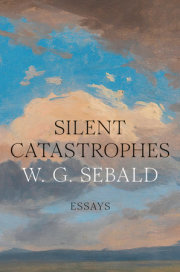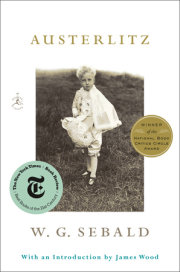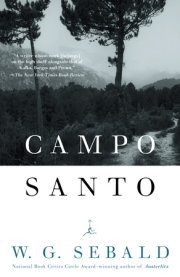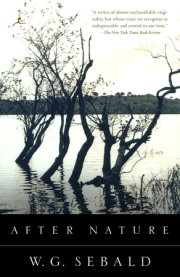POEMTREES
For how hard it is to understand the landscape as you pass in a train from here to there and mutely it watches you vanish.
A colony of allotments uphill into the fall. Dead leaves swept into heaps. Soon--on Saturday-- a man will set them alight.
Smoke will stir no more, no more the trees, now evening closes on the colors of the village. An end is come to the workings of shadow. The response of the landscape expects no answer.
The intention is sealed of preserved signs. Come through rain the address has smudged. Suppose the “return” at the end of the letter! Sometimes, held to the light, it reads: “of the soul.”
Nymphenburg
Hedges have grown over palace and court. A forgotten era of fountains and chandeliers behind façades, serenades and strings, the colors of the mauves. The guides mutter through sandalwood halls of the Wishing Table in the libraries of princes past.
Epitaph
On duty on a stretch in the Alpine foothills the railway clerk considers the essence of the tear-off calendar.
With bowed back Rosary Hour waits outside for admittance to the house
The clerk knows: he must take home this interval without delay
Schattwald in Tyrol
The signs are gathered settled at dusk’s edge carved in wood bled and blackened printed on the mountain
Hawthorn in the hedgerow along a length of path black against winter’s papyrus the Rosetta stone
In the house of shadows where the legend rises the deciphering begins Things are different from the way they seem Confusion among fellow travelers was ever the norm
Hang up your hat in the halfway house
Remembered Triptych of a Journey from Brussels
White over the vineyard by Sankt Georgen white falls the snow across the courtyard and on the label of an orange-crate from Palestine. White over black is the blossom of the trees near Meran in Ezra’s hanging garden. Autumn in mind April waits in the memory painted on walnut like the life of Francis of Assisi.
At the end of September on the battlefield at Waterloo fallow grass grows over the blood of the lost Marie-Louises of Empereur Bonaparte you can get there by bus at the Petite-Espinette stop change for Huizingen a stately home, sheltered by ivy, transformed into the Belgian Royal Ornithological Research and Observation Unit of the University of Brussels.
On the steps I met Monsieur Serge Creuve, painter, and his wife Dunja-- he does portraits in red chalk on rough paper of rich people’s children from Genesius-Rhode.--Lures them into the house with the unique WC, well-known to neighbors.--One does like to visit an artist. “Shall we buy the ferme in Genappe?”
In the evening at Rhode-St. Genèse a timid vegetable man carries his wares up garden paths past savage dogs to the gate, for instance, of the Marquise of O.’s villa. A woman’s mouth is always killed by roses.
As a lodger on the third floor-- the red sisal only goes up to the second-- of Mme. Muller’s Cafeteria five minutes’ walk from the Bois de la Cambre I’m the successor to Robert Stehmer student from Marshall Missouri. Gold-rimmed jug-and-bowl on the dresser a hunting scene over the Vertiko cabinet door to an east-facing balcony.--At night noises on the road to Charleroi.
Chestnuts fell from their husks in the rain. I saw them in the morning glossy on the sand of the patio. I saw them in the morning-- taking tea and Cook Swiss to be eaten with a knife and fork. I saw them in the morning waiting behind the curtain for a trip to town in quest of Brueghel at the Musee Royal.
Depart quai huit minuit seize le train pour Milan via St. Gotthard I recognized Luxemburg by the leaves on its trees then came industrie chimique near Thionville, light above the heavenly vaults Bahnhof von Metz, Strasbourg Cathedral bien eclairee.--Between thresholds lines from Gregorius, the guote sundaere, from Au near Freiburg, rechtsrheinisch, not visible from Colmar--Haut Rhin. Early morning in Basel, printed on hand-made Rhine-washed lumpy paper under the supervision of Erasmus of Rotterdam by Froben & Company, fifteen hundred and six. Men on military service bound for Balsthal in the Jura shaved and cropped, several smoking, outside all changed.
Route of all images light gray river-sand ruddy hair minding swollen shadows lances and willows White leaf, you Green leaf, me Rafael, Yoknapatawpha, Light in August between leaves anxious mellowing before birth as a shadow over the sunny road
Go to the Aegean to Santorini Land of basalt phosphorescence on the rudder Hold the water in your hand: it glows--at night-- aubergines in front of the house shadowy in the dark against the whitewashed wall bright green in daytime purple raffia-threaded in the sun.
Life Is Beautiful
Days when At the crack of dawn The early bird Squats in my kitchen. It shows me the worm Which sooner than later Will lead me up the garden path. I’ve already bought My pig in a poke It’s all Tom or dick Kids or caboodle In the home and castle. My day is truly Wrecked.
Matins for G.
There he stood In the early morn And wanted in. It’s warm In front of the fire. Lug a-cock The man waited For some response To his knock. Came a bawl from within: Jesus Mary A pain in the neck In the early morn. Where no kitchen There no cook. We don’t need no King. The man has heard As much before. He has heard enough. Right then: all or nothing.
Winter Poem
The valley resounds With the sound of the stars With the vast stillness Over snow and forest.
The cows are in their byre. God is in his heaven. Child Jesus in Flanders. Believe and be saved. The Three Wise Men Are walking the earth.
Lines for an Album
Quick as a wink, a star Falls from heaven Like nothing That grows on trees. Now make a wish But don’t tell a soul Or it won’t come true Ready or not Here I come!
Bleston A Mancunian Cantical
I. Fête nocturne
I know there exists A shuttered world mute And without image but for example The starlings have forgotten their old life No longer flying back to the south Staying in Bleston all winter In the snowless lightless month Of December swarming during the day From soot-covered trees, thousands of them In the sky over All Saints Park Screaming at night in the heart In the brain of the city huddled together Sleepless on the sills of Lewis’s Big Warehouse Between Victorian patterns And roses life was a matter Of death and cast its shadows Now that death is all of life I wish to inquire Into the whereabouts of the dead Animals none of which I have ever seen
II. Consensus Omnium
In eternity perhaps All we experience Becomes bitter Bleston Founded by Cn. Agricola Between seventy and eighty A.D. Appears in the ensuing Era to have been A bleak and forsaken place Bleston knows an hour Between summer and winter Which never passes and that Is my plan for a time Without beginning or end Bleston Mamucium Place of Breast-like hills The weather changes It is late in our year Dis Manibus Mamucium Hoc faciendum curavi
III. The Sound of Music
An unfamiliar lament And the astonishment that Sadness exists--one’s own Never the other of those who suffer Of those whose right it really is Life is uncomplaining in view of the history Of torture a travers les ages Bleston Uncomplaining is this mythology without gods The mere shadow of a feast-day phantom Of a defunct feast-day Bleston From time to time the howls Of animals in the zoological Department reach my ears While I hold in my hands The burnt husks of burnt chestnuts The silence of revelation Sharon’s Full Gospel--the sick are Miraculously healed before our eyes The ships lie offshore Waiting in the fog
IV. Lingua Mortua
He couldn’t help it Kebad Kenya If the years of all humanity lay Strewn about him in their thousands debris Erratic and glacial white in the moonlight Reclining in silence on the river of time Hipasos of Metapontum by the Gulf of Tarentum Made bronze disks of varying thickness ring out Five hundred years before Christ Et pulsae referent ad sidera valles-- It was Pythagoras however of whom it was said He possessed the secret of listening to the stars The valleys of Bleston do not echo And with them is no more returning Word without answer fil d’Ariane until your blood Hunts you down with opgekilte schottns Alma quies optata veni nam sic sine vita Vivere quam suave est sic sine morte mori Only in the wasteland does Rapunzel find bliss With the blind man Bleston my ashes In the wind of your dreams
V. Perdu dans ces filaments
But the certitude nonetheless That a human heart Can be crushed--Eli Eli The choice between Talmud and Torah Is hard and there is no relying On Bleston’s libraries Where for years now I have sought With my hands and eyes the misplaced Books which so they say Mr. Dewey’s International classification system With all its numbers still cannot record A World Bibliography of Bibliographies On ne doit plus dormir says Pascal A revision of all books at the core Of the volcano has been long overdue In this cave within a cave No glance back to the future survives Reading star-signs in winter one must Cut from pollard willows on snowless fields Flutes of death for Bleston
Didsbury
Sunday was fed Up to the teeth With church bells Summer hats Gardening
Birds were squabbling Over Lord knows what Among the withered Chestnut blossom
The presbyter went To his May devotions And it took A long time To get dark
Before it did The birds made A din In the trees
Giulietta’s Birthday
The French windows Are open still As if in the theatre People wait On the colors of the carpet In the cadence of dusk
Irony it is said Is a form of humility
Glass in hand They come and go Stop still and expect The metamorphosis of hawthorn In the garden outside
Time measures Nothing but itself
In the courtyard of a monastery in Holland My name escaped me Early in life according to Scott Swift had acquired the habit Of celebrating his birthday In dejection
One leaves behind one’s portrait Without intent
Time Signal at Twelve
for Lejzer Ajchenrand
His eyes Home in On the real
There is Skulduggery Afoot
A raven alights At God’s ear Tidings he brings Of the battlefield
Father has gone to war The monk from Melk Sleeps in his quiet grave The snow Falls on his house
If no one asks him He knows But if someone asks him He knows not When the Weisers Will meet
Something not a soul Has ever seen
Children’s Song
for little Solveig
Fieldwards goes the day Mildew grows in the garden Measles cover the man Like a thousand butterflies
Fieldwards goes the day Long long ago Studded with stars was the sky A thousand butterflies
Come from the fields is a day A coachman stands at the bone-house Holding in his hands The thousand butterflies
SCHOOL LATIN
Votive Tablet
Weary of always the same trees and a country far from crossed the legionnaire rests in fancy’s meagre holding
Revolving around him by turns his life and a bloom of tobacco smoked by the wayside
The hammered out sections show him whenever he moves which of his organs alas are sick
Cheerful after all humbly sat on his shield he bids us good day the one-eyed king of the blind
Legacy
Our memories are quite similar but pickled alive in a poison which
accompanies objects too as a part of this emptiness
The heartening message that Pythagoras once would listen to the stars barely comes down to us now
Then let us hope our children are learning to dance in the dark
Sarassani
With borrowed voices the ventriloquist renders others’ pipe-dreams
A gentleman disguised as a moth pulls tropical birds from a hat
The gaudiest parrot weighs a memorized word destiny in his hand
As accustomed dupes the local fowls sit in the cheap seats thrilling to the da capo
Day’s Residue
Dialectically thrashed out campaigns and drafts from days pending wasted battles
Like every evening the set task is left undone in the sandpit
Heeding a dubious silence I sleep at night with my ear to the ground
Its distant sounds spell out the lessons of a lighter world
Border Crosser
My beard grows overnight every time like a dead man’s
I have even begun to speak in foreign tongues roaming like a nomad in my own town weighing the witch’s thaler in my hand
It would seem to be time to apply to the outworks and register what we have forgotten
Once there given the superior outlook my poor sedentariness will pass
Lay of Ill Luck
In honor of my canny schoolmate and god of wonders I had promised a Chinese fable
In crow’s-feet characters the black bird translated itself nimbly to my page
The little vixen however escaped and tumbled in the grass and all but laughed herself to death
So all I have left is this monosyllabic creature on my shoulder
Memorandum of the Divan
The mightiest however seem those kings who have never lived
Even today they tempt us on tours to Soliman’s garden on a horse with clipped wings
To comfort the bereaved it is advisable that reports of such trips be prepared in advance
For it will often have proved far too lovely to return in any calculable future
Il ritorno d’Ulisse
Returning from a lengthy trip he was astonished to find he had strayed to a country not his place of origin
For all his encounters in scattered spots with the black paper hearts of men shot by the arquebuse his bow-and-arrow story did not happen
Then there was Penelope’s Castilian grandmother blocking his entry at the garden gate wordless and busy with embroidery
Sure, the grandchildren are smiling in the background apparently better disposed towards foreigners
Their furtive hopes still almost too small for the naked eye
(But the idea is good and the noise far away even the building)
For a Northern Reader
Until the light has failed as if bereft the white mist barely infiltrating the trees
and as if they were painted on a green landscape the animals descending to their black shelters come to a standstill at the edge of our gaze
resolute half his journey done our ailing neighbor too pauses reckoning the distance left
Florean Exercise
The band was playing and singing a little Turkish marching song, with ensigns shouldered they filed out onto the plain at their ease to where their ships lay concealed beneath the cliffs
Their camp has long been abandoned the soldiers long ago returning to an older post in a different time
But in Northamptonshire their legacy has remained green acanthus and orchards houses inhabited still by the Roman gaze
Guarding what once was brought here safely from afar the Dardanian gods
Copyright © 2012 by W.G. Sebald. All rights reserved. No part of this excerpt may be reproduced or reprinted without permission in writing from the publisher.










